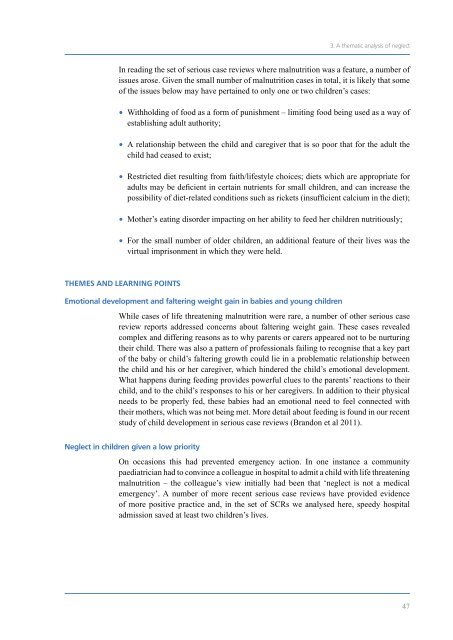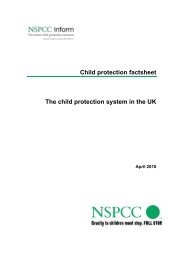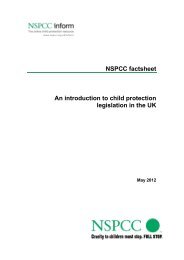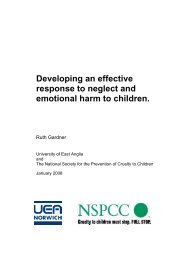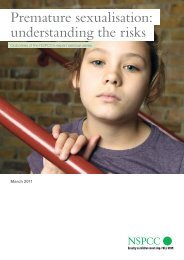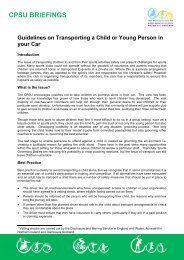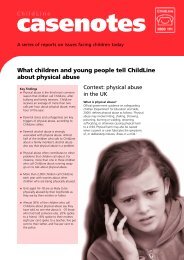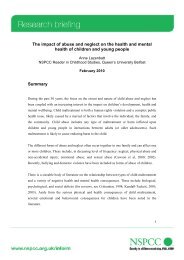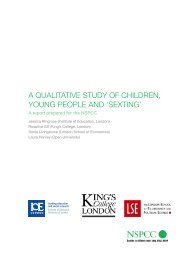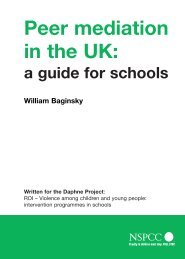Neglect and serious case reviews (PDF, 735KB) - nspcc
Neglect and serious case reviews (PDF, 735KB) - nspcc
Neglect and serious case reviews (PDF, 735KB) - nspcc
Create successful ePaper yourself
Turn your PDF publications into a flip-book with our unique Google optimized e-Paper software.
In reading the set of <strong>serious</strong> <strong>case</strong> <strong>reviews</strong> where malnutrition was a feature, a number of<br />
issues arose. Given the small number of malnutrition <strong>case</strong>s in total, it is likely that some<br />
of the issues below may have pertained to only one or two children’s <strong>case</strong>s:<br />
• Withholding of food as a form of punishment – limiting food being used as a way of<br />
establishing adult authority;<br />
• A relationship between the child <strong>and</strong> caregiver that is so poor that for the adult the<br />
child had ceased to exist;<br />
• Restricted diet resulting from faith/lifestyle choices; diets which are appropriate for<br />
adults may be deficient in certain nutrients for small children, <strong>and</strong> can increase the<br />
possibility of diet-related conditions such as rickets (insufficient calcium in the diet);<br />
• Mother’s eating disorder impacting on her ability to feed her children nutritiously;<br />
• For the small number of older children, an additional feature of their lives was the<br />
virtual imprisonment in which they were held.<br />
themeS aNd learNiNg poiNtS<br />
emotional development <strong>and</strong> faltering weight gain in babies <strong>and</strong> young children<br />
While <strong>case</strong>s of life threatening malnutrition were rare, a number of other <strong>serious</strong> <strong>case</strong><br />
review reports addressed concerns about faltering weight gain. These <strong>case</strong>s revealed<br />
complex <strong>and</strong> differing reasons as to why parents or carers appeared not to be nurturing<br />
their child. There was also a pattern of professionals failing to recognise that a key part<br />
of the baby or child’s faltering growth could lie in a problematic relationship between<br />
the child <strong>and</strong> his or her caregiver, which hindered the child’s emotional development.<br />
What happens during feeding provides powerful clues to the parents’ reactions to their<br />
child, <strong>and</strong> to the child’s responses to his or her caregivers. In addition to their physical<br />
needs to be properly fed, these babies had an emotional need to feel connected with<br />
their mothers, which was not being met. More detail about feeding is found in our recent<br />
study of child development in <strong>serious</strong> <strong>case</strong> <strong>reviews</strong> (Br<strong>and</strong>on et al 2011).<br />
<strong>Neglect</strong> in children given a low priority<br />
3. A thematic analysis of neglect<br />
On occasions this had prevented emergency action. In one instance a community<br />
paediatrician had to convince a colleague in hospital to admit a child with life threatening<br />
malnutrition – the colleague’s view initially had been that ‘neglect is not a medical<br />
emergency’. A number of more recent <strong>serious</strong> <strong>case</strong> <strong>reviews</strong> have provided evidence<br />
of more positive practice <strong>and</strong>, in the set of SCRs we analysed here, speedy hospital<br />
admission saved at least two children’s lives.<br />
47


